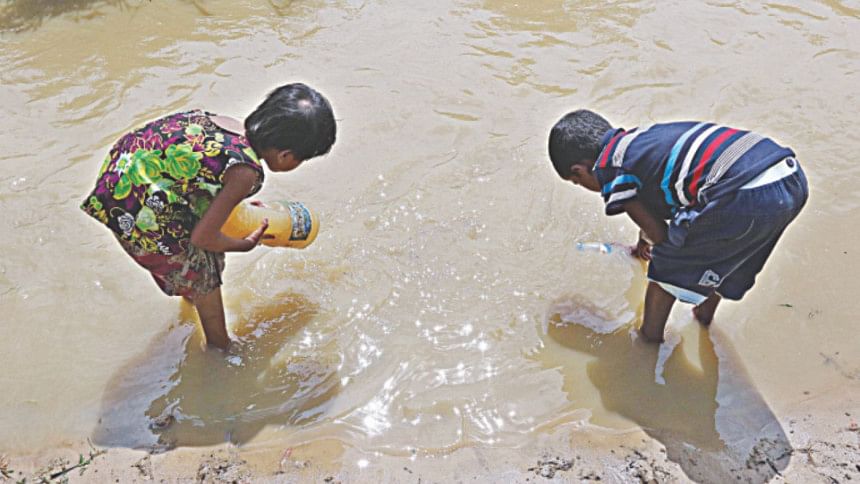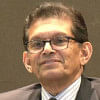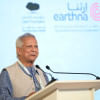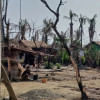Diseases stalk new camps

Tasmin has lost everything, literally, when the Myanmar army burned down her house in Andaung village in Maundaw.
But that is past and she has no time for that now. Her current concern is her eight-month-old son, Firozmin, who has been suffering from dysentery, fever and cough.
"I couldn't go to any doctor because I don't know anyone," she said sitting by the road at Balurdhala of Ukhia where she, her husband and her son took shelter on Saturday but could not manage a shade over their head yet.
During the perilous journey -- two days in Myanmar and seven days in Bangladesh with stopovers in Teknaf -- since September 2, the family had to get wet in the rain and then dry in the sun several times over. The elements took their toll on the baby boy.
In the last one week, the family got khichuri for two meals. For the rest of the times, they mainly ate flattened rice, puffed rice and biscuits they got from locals.
"The baby gets little breastfeeding. I don't get to eat myself. Where would the boy get milk from?… Can you help me find a doctor?" she pleaded to these correspondents.
Her concern is shared by many mothers with infants and young children who now live in makeshift camps by the roads along Kutupalang, Balukhali, Balurdhali and Tyinkhali in Ukhia.
The registered and unregistered camps that had nearly 2 lakh Rohingyas before August 26, when the first batches of the new arrivals started coming in, are now overflowing with refugees.
New camps mushroomed along the Cox's Bazar-Teknaf Highway and beyond as some 3 lakh Rohingyas arrived in Naikkhangchhari, Teknaf and Ukhia till yesterday after Myanmar's security forces began a crackdown in response to attacks by Rohingya insurgents on Myanmar police and army camps on August 25.
Thousands of them could not manage makeshift camps yet, and are living under the open sky. They wait on roadsides, even when it rains, hoping for communities or NGOs to give them food and clothes.
Last week, aid agencies and government officials estimated that nearly half of the new arrivals are children and adolescents, many of them needing immediate treatment.
While the previously built Rohingya camps have facilities for clean drinking water and latrines, the new ones do not. In some cases, NGOs and communities are providing bottled water and food for them, but not sanitary toilets.
As a result, they are defecating in the open, facing risks of contracting diseases like diarrhoea.
Also, health workers are not sure if the food the locals are giving them is always fresh and risk-free.
Rehana Begum, 40, at Balukhali Paanbazar camp, said she and her three-year-old son had been suffering from diarrhoea for the last five days. Besides, she also got skin diseases.
"There is a pond nearby, but we are not allowed to bathe or wash clothes there. I am wearing the same clothes for over 10 days," she said.
Asked if they had access to sanitary latrine, Rehana said, "This is a real problem. We dug a hole for defecation, but it is already filled."
Beauty Barua, senior staff nurse at Balukhali Sub-Health Centre, said diarrhoea cases were growing. Many are also suffering from fever, cold, injuries and skin diseases.
"On September 5, we got only 26 patients. But now about 80 patients are coming every day, most of them children," she told The Daily Star.
Many are also visiting the health facility with injuries, weaknesses and malnutrition.
Tarik Sayed Harun, assistant director of COAST Trust which is providing some primary healthcare and food to the Rohingyas, said the situation may turn "epidemic" if things did not improve.
"Many children with fever have started to contract pneumonia," he said.
Cox's Bazar Civil Surgeon Dr Abdus Salam said the number of patients rose significantly in the past few days.
"A community clinic in Balukhali is treating nearly 400 patients a day now," he said when these correspondents visited the clinic.
The pressure of patients in the health facilities in Ukhia and Teknaf tripled last week, he added, though he did not give the total number.
These correspondents saw the clinic of Doctors Without Borders at Kutupalang crammed with patients, mostly mothers bringing their children. Some of the patients also sat outside, waiting to enter the clinic around 10:30am yesterday.
Abdus Salam said 20 mobile health teams were working in the camps to create health awareness, providing water purifying tablets for water fetched from open sources, but that was not enough.
"We could arrange water and sanitation in all the registered and previously unregistered Rohingya camps, but not in the new ones yet," he said.
It is not possible unless the Rohingyas can be settled in a specific camp and necessary facilities are set up for water and sanitation there, the civil surgeon said. "The government has started working for that."
ROHINGYAS AT CMCH
At least 15 Rohingyas, aged between 11 and 50, were admitted to Chittagong Medical College Hospital (CMCH) yesterday with wounds, taking the total number of injured Rohingyas who came there to 84.
Of the total, two died of their wounds as of yesterday while eight were released after treatment, said Md Alauddin, assistant sub-inspector of CMCH police outpost.
Of the 15 admitted yesterday, 13 suffered bullet injuries and another was wounded in a road accident, he added.
LANDMINE KILL THREE
A suspected landmine planted near the Bangladesh border has killed three Rohingya villagers fleeing violence in Myanmar's Rakhine state, a Bangladesh border official quoted a survivor as saying.
Border Guard Bangladesh Commander Lieutenant Col Manzurul Hasan Khan told AFP that troops had heard the blast Saturday night about 100 metres from the border.
"We learnt from the survivor that there were four of them. The survivor said the other three died on the spot in an explosion -- likely an anti-personnel mine," Khan told the AFP.
He said the border guards saw the survivor coming to the demarcation line with multiple injuries to his body and face.

 For all latest news, follow The Daily Star's Google News channel.
For all latest news, follow The Daily Star's Google News channel. 








Comments